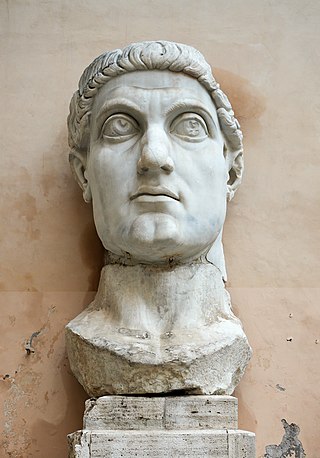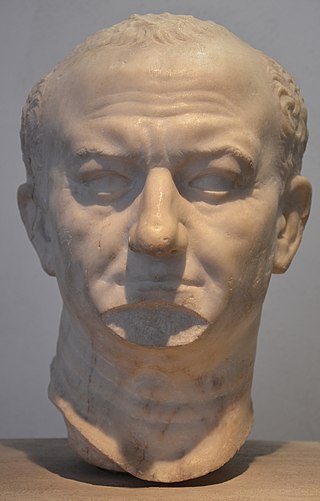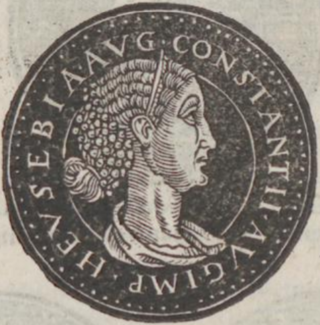Related Research Articles

Constantine I, also known as Constantine the Great, was a Roman emperor from AD 306 to 337 and the first Roman emperor to convert to Christianity. He played a pivotal role in elevating the status of Christianity in Rome, decriminalizing Christian practice and ceasing Christian persecution. This was a turning point the Christianization of the Roman Empire. He founded the city of Constantinople and made it the capital of the Empire, which it remained for over a millennium.

Flavius Valerius Constantius, also called Constantius I, was a Roman emperor from 305 to 306. He was one of the four original members of the Tetrarchy established by Diocletian, first serving as caesar from 293 to 305 and then ruling as augustus until his death. Constantius was also father of Constantine the Great, the first Christian emperor of Rome. The nickname "Chlorus" was first popularized by Byzantine-era historians and not used during the emperor's lifetime.

Jovian was Roman emperor from June 363 to February 364. As part of the imperial bodyguard, he accompanied Julian on his campaign against the Sasanian Empire. Julian was killed in battle, and the exhausted and ill-provisioned army declared Jovian his successor. Unable to cross the Tigris, Jovian made peace with the Sasanids on humiliating terms. He spent the rest of his seven-month reign traveling back to Constantinople. After his arrival at Edessa, Jovian was petitioned by bishops over doctrinal issues concerning Christianity. Albeit the last emperor to rule the whole Empire during his entire reign, he died at Dadastana, never having reached the capital.

Flavius Claudius Constantius Gallus was a statesman and ruler in the eastern provinces of the Roman Empire from 351 to 354, as Caesar under emperor Constantius II, his cousin. A grandson of emperor Constantius Chlorus and empress Flavia Maximiana Theodora, and a son of Julius Constantius and Galla, he belonged to the Constantinian dynasty. Born during the reign of his uncle Constantine the Great, he was among the few male members of the imperial family to survive the purge that followed Constantine's death. Under Constantius II, Gallus served as deputy emperor, based in Antioch and married to Constantius' sister Constantina. He dealt with a Jewish revolt in the years 351-352. Gallus ultimately fell out of favor with Constantius and was executed, being replaced as Caesar by his younger half-brother Julian.

The gens Flavia was a plebeian family at ancient Rome. Its members are first mentioned during the last three centuries of the Republic. The first of the Flavii to achieve prominence was Marcus Flavius, tribune of the plebs in 327 and 323 BC; however, no Flavius attained the consulship until Gaius Flavius Fimbria in 104 BC. The gens became illustrious during the first century AD, when the family of the Flavii Sabini claimed the imperial dignity.
Anicius Faustus was a Roman senator who was appointed consul in AD 298.

Eusebia was Roman empress as the second wife of Roman emperor Constantius II. The main sources for the knowledge about her life are Julian's panegyric "Speech of Thanks to the Empress Eusebia", as well as several remarks by the historian Ammianus Marcellinus.
A daughter of Julius Constantius and Galla, of unknown name, was Roman empress as the first wife of Constantius II.
Valerius Maximus was a Roman senator.
Vulcacius Rufinus was a Roman politician, related to the Constantinian dynasty.
Basilina was the wife of Julius Constantius and the mother of the Roman emperor Julian who in her honour gave the name Basilinopolis to a city in Bithynia.
Flavius Arintheus was a Roman army officer who started his career in the middle ranks and rose to senior political and military positions. He served the emperors Constantius II, Julian, Jovian and Valens. In 372 he was appointed consul, alongside Domitius Modestus.
Victor was a Roman military officer and politician, who served the emperors Constantius II, Julian, Jovian and Valens. He was appointed consul in AD 369, alongside Valentinianus Galates.
Flavius Eusebius was a Roman Senator, who was the brother-in-law of the emperor Constantius II.
Flavius Hypatius was a Roman Senator, who was the brother-in-law of the Roman emperor Constantius II.
Flavius Optatus was a Roman senator who was appointed consul in AD 334. He was possibly related to the emperor Constantine I.
Flavius Salia was a Roman military officer who was appointed consul in AD 348.
Afranius Hannibalianus was the consul of 292 AD, a praetorian prefect, a senator and a military officer and commander.
Seleucus also known as Flavius Seleucus and Count Seleucus was a wealthy Greek rhetor who was a close friend of Libanius and the Roman emperor Julian.

Flavius Abinnaeus was a Roman officer in Egypt from 303 to 351.
References
- ↑ Martindale & Jones, pgs. 307-308
- ↑ Michael H. Dodgeon, Samuel N. C. Lieu, The Roman Eastern Frontier and the Persian Wars (AD 226-363): A Documentary History (1994), pg. 338
- ↑ Barnes, T. D., Christians and Pagans under Constantius in L'Eglise et L'Empire au IV Siecle (1989), pg. 317
- ↑ Martindale and Jones, pg. 308